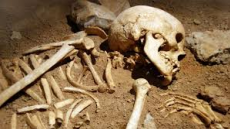

GCSE BIOLOGY REVISION: DECOMPOSITION
Please note: Text in bold is what the AQA GCSE biology specification requires an understanding of.
Gardeners and farmers try to provide optimum conditions for rapid decay of waste biological material. The compost produced is used as a natural fertiliser for growing garden plants or crops.
Compost and manure are added to soils by farmers and gardeners to improve the quality of soil. How is compost made? From dead plants. What is manure? Animal waste. Once compost and manure is present in soil, they are broken down by decomposers into minerals. Not only are bacteria and fungi decomposer, but worms too. This process helps to recycle minerals as they are then absorbed by new plants for plant growth. Adding compost and manure helps improve the quality of soil by increasing water retention and aeration.
Additionally, farmers can also use inorganic fertilisers to overcome soil mineral deficiencies, this does not involve decomposers.
A key recycled element is nitrogen, used to make proteins. Plants are unable to absorb nitrogen gas so need to receive it in the form of nitrate ions. Nitrate ions are produced as a result of a series of reactions (which you will learn about if you decide to take a level biology), these reactions involve decomposers. Nutrients and minerals are passed along food chains through organisms being consumed by others.
IMPACT OF ENVIRONMENTAL CHANGE
Students should be able to evaluate the impact of environmental changes on the distribution of species in an ecosystem given appropriate information.
Questions will test whether you are able to draw relevant conclusions from given information as well as being able to apply knowledge you have previously learnt to the specific question. It is important to use the correct terminology.
Environmental changes affect the distribution of species in an ecosystem. These changes include:
temperature
availability of water
composition of atmospheric gases.
The changes may be seasonal, geographic or caused by human interaction.
Different organisms are adapted to different temperatures. Hence, why climate change holds a massive threat to many species. As we have previously discussed, water is necessary for all organisms to survive, where there is a lack of water, there is a lack of organisms. Plants need availability of carbon dioxide to photosynthesise. Most organisms including plants, animals and many bacteria need oxygen for respiration.
BIODIVERSITY AND THE EFFECT OF HUMAN INTERACTION ON ECOSYSTEM
Biodiversity is the variety of all the different species of organisms on earth, or within an ecosystem.
Biodiversity definition- the variety of plant and animal life in the world or in a particular habitat, a high level of which is considered to be important and desirable. Tropical rainforests are home to millions of different species and are therefore, very diverse. Adversely, polar regions have fewer different species and are less diverse. Biodiversity is referring specifically to the number of different species. A large population of a particular species is not biodiverse.
image- http://mentalfloss.com/article/544706/facts-about-human-decomposition

0 Comment:
Be the first one to comment on this article.